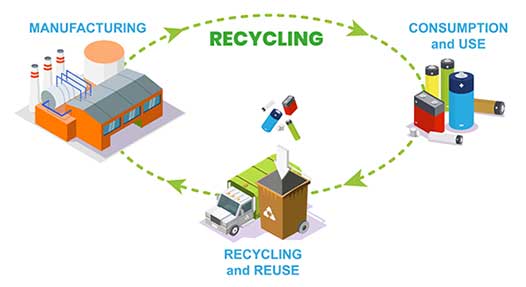For more than 50 years, we have been at the forefront of plastic waste recycling. Our Mumbai-based company specializes in the recycling of all kinds of plastic waste and is among the top polymer waste recyclers in India. The company has evolved over three generations, led by individuals who have demonstrated an unwavering commitment to creating and maintaining a clean and safe environment for future generations and our planet.
EPR Certificate is widely acknowledged as a trailblazer in plastic waste management, having begun its journey by producing reprocessed plastic granules from waste or scrap.


We take great care in ensuring that these individuals are equipped with the necessary knowledge and skills to identify the different types of plastics and sort them accordingly, thus reducing the amount of waste that ends up in landfills or the ocean. By investing in such training programs, we aim to create a more sustainable future for our planet.
OVER 100+ TRAINING AND AWARENESS PROGRAMS ON WASTE MANAGEMENT CONDUCTED BY EPR CERTIFICATE CUSTOM INDUSTRIES.
Over the years, we have undertaken more than 100 training and awareness programs aimed at addressing the pressing issues related to waste management across India. These programs have been geared towards increasing the public’s knowledge and awareness about the importance of proper waste disposal and management.
In addition to these training programs, we have organized various social awareness programs on plastic waste management in different settings such as NGOs, companies, schools, hospitals, societies, marine academies, and government bodies. These programs aim to educate people about the impact of plastic waste on the environment and promote responsible waste management practices.
One of our key initiatives is to provide training to rag-pickers and collection center staff on the proper segregation of plastics to enable efficient recycling.
EPR Certificate Custom has established a strategic partnership with the Municipal Corporation in all states where plastic waste is generated in large quantities. With a pan-India presence and a vast network of over 40 collection centers, we collaborate with numerous collection partners located across India. A majority of our partners have extensive experience in the industry, with more than 20 years of experience and well-established connections in the nearby areas.
At our collection centers, we collect both MLP and Non-MLP waste through waste collectors, aggregators, traders, and societies. Our collection managers work on the ground level with rag pickers to ensure the best returns on the waste collected by them. We prioritize detailed training programs for every rag picker to teach them how to extract the best output from scrap and ensure proper segregation of waste based on its nature.
Every day, we collect both recyclable and non-recyclable plastic waste materials from various sources. These materials are then further processed at our re-processing facilities across India. Additionally, non-recyclable waste is sent for environmentally sound end-of-life disposal, such as being used as a fuel in cement kilns or at waste-to-energy plants. Our commitment to responsible waste management practices helps us create a cleaner and more sustainable future.
We give you detailed monthly reports on every stage of the plastic waste management process, so you know exactly what’s happening from collection to disposal. We make sure everything is transparent and there’s no duplication.
We conduct third-party audits at our collection centers and recycling facility to make sure we’re collecting and recycling plastic waste properly. We also give you transport details, like weight receipts and invoices, so you have all the information you need.
Our documentation includes invoices, weight receipts, payment receipts, process flow, and certificates of processing. This gives you a complete picture of how we manage plastic waste.

We take pride in actively participating in the ‘Swachh Bharat Abhiyan’ campaign initiated by the Government of India to promote cleanliness nationwide. Over the course of our 50+ years in the industry, we have developed end-to-end solutions for managing plastic waste that is currently being discarded in bulk quantities every day.
By implementing a comprehensive training module covering collection, segregation, baling, weighing, recycling, and processing of such waste from streets, we have established ourselves as a key player in the initiative to ensure total cleanliness across the nation.
Frequently Asked Questions
-
What is Extended Producers Responsibility?
Extended Producer Responsibility (EPR) is a responsibility given to producers, manufacturers, and importers for environmentally sound disposal/recycling of post-consumer waste under The Plastic Waste Management Rules, 2016.
-
Extended Producers Responsibility Implementation Process
The first step is to register with the CPCB/SPCB by submitting the necessary documents, which include an action plan, agreement, certificates, licences, and so on.
The following phase is an authorised waste management agency collecting the agreed volume of post-consumer plastic waste from the intended location over a one-year period and recycling or disposing of it securely in accordance with CPCB/SPCB norms.
The waste collection agency will give evidence of waste collection operations in the form of appropriate papers.
A quarterly report will be submitted to CPCB on behalf of PIBOM’s.
The agency will submit a final report to PIBOM after the activity is completed. -
Methods of Waste Disposal under EPR
Waste collected under the EPR is transported to the nearest disposal or recycling facility and processed through one of the following methods.
Used as fuel in Cement Kiln.
WTE Recovery,
Recycling. -
What is multi-layered plastic waste?
Multi-layer Plastic Waste is a type of plastic waste that has multiple layers of plastic, such as packaging chips. (There are numerous layers of plastic and aluminium used for packaging.
-
Is it Possible to Recycle Multi-Layered Plastic?
Yes,! WE recycle multilayered post-consumer plastic waste into PCR Granules, which may then be utilised to make a variety of recycled products.
